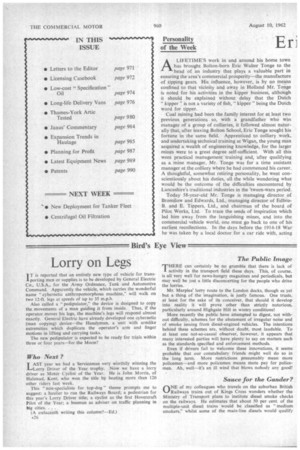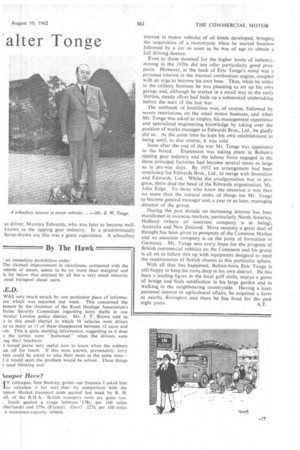Bird's Eye View By The Hawk
Page 28

Page 29

If you've noticed an error in this article please click here to report it so we can fix it.
Lorry on Legs
JT is reported that an entirely new type of vehicle for transporting men or supplies is to be developed by General Electric Co., U.S.A., for the Army Ordnance, Tank and Automotive Command. Apparently the vehicle, which carries the wonderful name cybernetic anthropomorphous machine," will walk on two 12-ft legs at speeds of up to 35 m.p.h.
Also called a " pedipulator," the device is designed to copy the movements of a man guiding it from inside. Thus, if the operator moves his legs, the machine's legs will respond almost exactly, General Electric have already developed one cybernetic (man copying) device—the Handyman, a unit with armlike extremities which duplicate the operator's arm and finger motions in lifting and carrying tasks.
The new pedipulator is expected to be ready for trials within three or four years—for the Moon?
Who Next ?
LAST year we had a Serviceman very Worthily winning the Lorry Driver of the Year trophy. Now we have a lorry driver as Motor Cyclist of the Year. He is John Morris, of Halstead, Kent, who won the title by beating more than 120 other riders last week, This "non-specialists for top-dog" theme prompts me to suggest: a haulier to run the Railways Board; a pedestrian for this year's Lorry Driver title; a cyclist as the first Hovercraft Pilot of the Year; a busman as adviser on traffic planning in big cities. . . .
(A ccelacanth writing this column?—Ed.) 26
The Public Image
THERE can certainly be no grumble that there is lack of I activity in the transport field these days. This, of course, is all very well for news-hungry magazines and periodicals, but may well be just a little disconcerting for the people who drive the lorries.
Mr. Marples' lorry route to the London docks, though as yet but a thing of the imagination, is justly famous. One trusts, at least for the sake of its conceiver, that should it develop into reality it will prove other than strictly notorious, particularly around Highgate Hill in wintry conditions!
More recently the public have attempted to digest, not without difficulty, schemes for the abatement of irregular noise and of smoke issuing from diesel-engined vehicles. The intentions behind these schemes are, without doubt, most laudable. To at least one not-so-casual observer, however, it appears that many interested parties will have plenty to say on matters such as the standards specified and enforcement methods.
Even if drivers fail to welcome these innovations, it seems probable that our constabulary friends might well do so in the long term. More restrictions presumably mean more policemen—and more policemen means more pay for policemen. Ah, well--it's an ill wind that blows nobody any good!
Sauce for the Gander?
(NNE of my colleagues who travels on the suburban British 4.-"Railways trains out of Kings Cross wonders whether the Ministry of Transport plans to institute diesel smoke checks on the railways. He estimates that about 50 per cent. of the multiple-unit diesel trains would be classified as "medium smokers," whilst some of the main-line diesels would qualify an immediate prohibition order.
The claimed improvement in cleanliness, compared. with the ndards of steam, seems to be no more than marginal and Is far below that attained by all but a very small minority road transport diesel users.
• E.D•
WAS very much struck by one particular piece of informaion which was reported last week. This concerned the tement by the chairman of the Road Haulage Association's hides Security Committee regarding lorry thefts in one -ticular London police district. Mr. J. T. Brown told us .t in this small district in which 58 vehicles were driven ay as many as 11 of these disappeared between 12 noon and
This is quite startling information, suggesting as it does t the lorries were " borrowed " when the drivers were ing their luncheon.
t would prove very useful now to know when the robbers ;ak off for lunch. If this were known, presumably, lorry vers could be asked to take their meal at the same time—
it would seem the problem would be solved. These things I need thinking out!
heaper Here?
,colleague, Sam Buckley, points out (because easked him to calculate it for ;me) that—by comparison with the union Market transport costs quoted last week by R. H. oil, of the R.H.A.—British transport costs are quite low. . Insoll quoted a range between 178s. per 100 miles Aherlands) and 379s. (France). Curs? 227s. per 100 miles a maximum-capacity vehicle.
















































































































